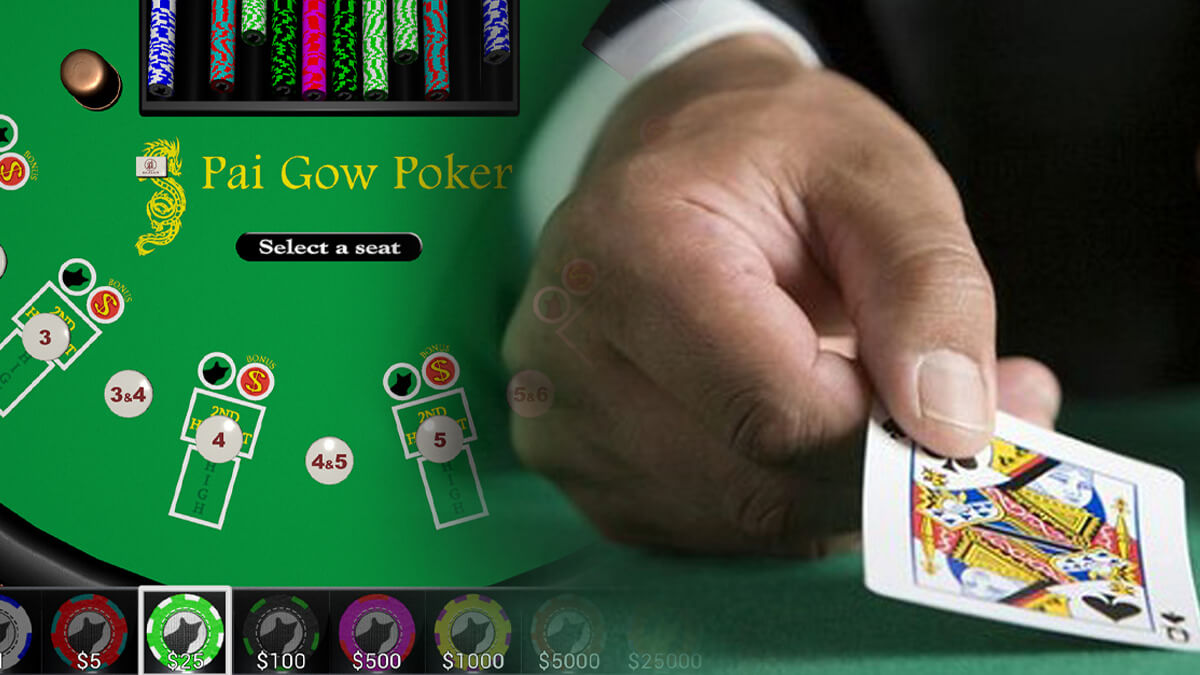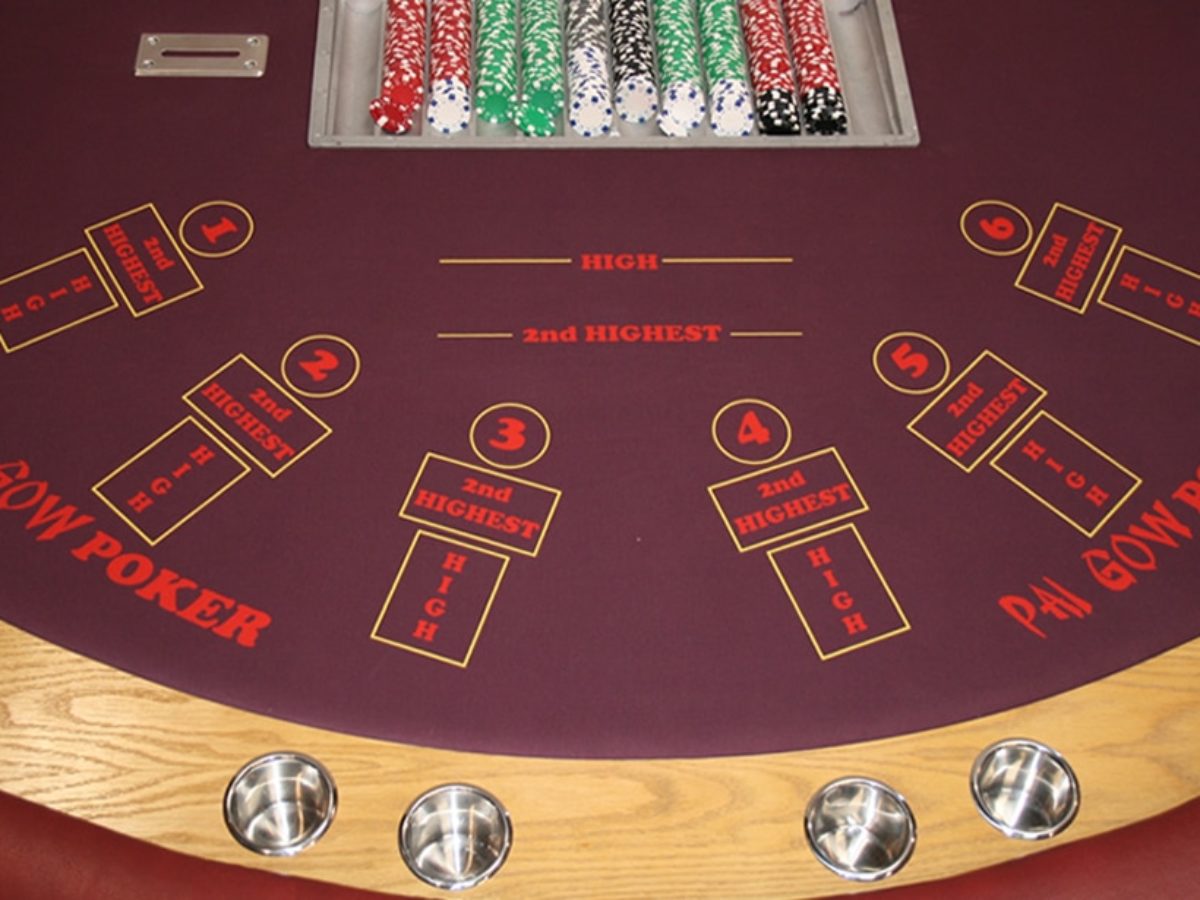Pai Gow Casino Game
You may have heard of Pai Gow, the domino game originating from ancient China, but if you’ve ever been to a land or online casino since 1985, you may be more familiar with the contemporary, exhilarating game of Pai Gow poker. Taking the best parts of Pai Gow and poker, Pai Gow poker has been a favorite of gamblers the world over. Unlike video poker games where Jokers are fully wild, in Pai Gow Poker the Joker can be used as an Ace or it can help you finish a straight, flush, straight flush, or royal flush.

Pai gow (Chinese: 牌九; pinyin: pái jiǔ; Jyutping: paai4 gau2) is a Chinesegamblinggame, played with a set of 32 Chinese dominoes. It is played in major casinos in China (including Macau); the United States (including Boston, Massachusetts; Las Vegas, Nevada; Reno, Nevada; Connecticut; Atlantic City, New Jersey; Pennsylvania; Mississippi; and cardrooms in California); Canada (including Edmonton, Alberta and Calgary, Alberta); Australia; and, New Zealand.
The name 'pai gow' is sometimes used to refer to a card game called pai gow poker (or “double-hand poker”), which is loosely based on pai gow.
Rules[edit]
Starting[edit]
Tiles are shuffled on the table and are arranged into eight face-down stacks of four tiles each in an assembly known as the woodpile. Individual stacks or tiles may then be moved in specific ways to rearrange the woodpile, after which the players place their bets.
Next, each player (including the dealer) is given one stack of tiles and must use them to form two hands of two tiles each. The hand with the lower value is called the front hand, and the hand with the higher value is called the rear hand. If a player's front hand beats the dealer's front hand, and the player's rear hand beats the dealer's rear hand, then that player wins the bet. If a player's front and rear hands both lose to the dealer's respective hands, the player loses the bet. If one hand wins and the other loses, the player is said to push, and gets back only the money he or she bet. Generally seven players will play, and each player's hands are compared only against the dealer's hands; comparisons are always front-front and rear-rear, never one of each.
There are 35,960 possible ways to select 4 of the 32 tiles when the 32 tiles are considered distinguishable. However, there are 3620 distinct sets of 4 tiles when the tiles of a pair are considered indistinguishable. There are 496 ways to select 2 of the 32 tiles when the 32 tiles are considered distinguishable. There are 136 distinct hands (pairs of tiles) when the tiles of a pair are considered indistinguishable.
Basic scoring[edit]
The name 'pai gow' is loosely translated as 'make nine' or 'card nine'. This reflects the fact that, with a few high-scoring exceptions, the maximum score for a hand is nine. If a hand consists of two tiles that do not form a pair, its value is determined by adding up the total number of pips on the tiles and dropping the tens digit (if any). Examples:
- 1–3 with 2-3: value 9 (nine pips altogether)
- 2–3 with 5-6: value 6 (16 pips; drop the 10)
- 5–5 with 4-6: value 0 (20 pips; ones digit is zero)
Gongs and Wongs[edit]
There are special ways in which a hand can score more than nine points. The double-one tiles and double-six tiles are known as the Day and Teen tiles, respectively. The combination of a Day or Teen with an eight results in a Gong, worth 10 points, while putting either of them with a nine creates a Wong, worth 11. However, when a Day or Teen is paired with any other tile, the standard scoring rules apply.
Gee Joon tiles[edit]

The 1-2 and the 2-4 tiles are called Gee Joon tiles and act as limited wild cards. When used as part of a hand, these tiles may be scored as either 3 or 6, whichever results in a higher hand value. For example, a hand of 1-2 and 5-6 scores as seven rather than four.
Pairs[edit]
The 32 tiles in a Chinese dominoes set can be arranged into 16 pairs, as shown in the picture at the top of this article. Eleven of these pairs have identical tiles, and five of these pairs are made up of two tiles that score the same, but look different. (The latter group includes the Gee Joon tiles, which can score the same, whether as three or six.) Any hand consisting of a pair outscores a non-pair, regardless of the pip counts. (Pairs are often thought of as being worth 12 points each.)
When the player and dealer both have a pair, the higher-ranked pair wins. Ranking is determined not by the sum of the tiles' pips, but rather by aesthetics; the order must be memorized. The highest pairs are the Gee Joon tiles, the Teens, the Days, and the red eights. The lowest pairs are the mismatched nines, eights, sevens, and fives.
Ties[edit]
When the player and dealer display hands with the same score, the one with the highest-valued tile (based on the pair rankings described above) is the winner. For example, a player's hand of 3-4 and 2-2 and a dealer's hand of 5-6 and 5-5 would each score one point. However, since the dealer's 5-5 outranks the other three tiles, he would win the hand.
If the scores are tied, and if the player and dealer each have an identical highest-ranking tile, the hand is ruled a copy and the dealer wins. For example, if the player held 2-2 and 1–6, and the dealer held 2-2 and 3–4, the dealer would win since the scores (1 each) and the higher tiles (2-2) are the same. The lower-ranked tile in each hand is never used to break a tie.
There are two exceptions to the method described above. First, although the Gee Joon tiles form the highest-ranking pair, they are considered to have no value when evaluating ties. Second, any zero-zero tie is won by the dealer, regardless of the tiles in the two hands.
Strategy[edit]
The key element of pai gow strategy is to present the optimal front and rear hands based on the tiles dealt to the player. There are three ways to arrange four tiles into two hands when no two of them form a pair. However, if there is at least one pair among the tiles, there are only two distinct ways to form two hands.
Using the tiles shown at right, the following hands and scores are possible:
- A and B (0), C and D (0)
- A and C (5), B and D (5)
- A and D (3), B and C (7)

The player must decide which combination is most likely to give a set of front/rear hands that can beat the dealer, or at least break a tie in the player's favor. In some cases, a player with weaker tiles may deliberately attempt to attain a push so as to avoid losing the bet outright. Many players rely on superstition or tradition to choose tile pairings.
See also[edit]
External links[edit]
| Wikimedia Commons has media related to Pai Gow. |

- Pai gow lore at Wizard of Odds website (Michael Shackleford)
Pai Gow is based on an old Chinese dominos game that was later converted into poker for those who prefer cards. Today, you can find it in online and land-based casinos, and it is played with a traditional 52-card deck. Learning more about the Pai Gow card game can help you enjoy the time you spend playing, and it may even boost your winnings, too.
What is Pai Gow Poker and How Does It Compare to Other Poker
Pai Gow puts the player against the dealer with a 52-card deck plus the Joker. After betting, both you and the dealer receive seven cards; your cards are face-up while the dealer's cards are face-down. You must divide those seven cards into one hand with five cards and another hand with two cards, and the former must rank higher than the latter in order to win the bet. All wins are even money Pai Gow.
The Pai Gow card game is different from other forms of poker namely because the player does not compete with other players at the table. You will only compete against the house. What's more, in almost every Pai Gow poker casino, there is a significant house edge of between 2.5% and 2.7% when using a simplified strategy. Many other poker games have a much lower house edge, and rather than playing against the house, you will play against other people.
Pai Gow Poker Las Vegas
Tips When Playing the Pai Gow Card Game
When playing Pai Gow, there are a few tips to keep in mind to help you get the most out of your experience and win against the house more frequently.
- Study the hand ranks - Your goal is to separate your cards into hands that rank higher than the dealer's hand, so understanding the various ranks - starting with Straight, Flush, Straight Flush and Royal Flush - will help you make better choices.
- The larger hand must be the stronger one - When building your hand, remember that the five-card one must always rank higher than the smaller two-card one. Otherwise, you will lose that bet.
- Practice at home by yourself - Before you start playing for real money, get out a deck of cards or find a free game online and practice. This is the best way to familiarize yourself with the game and grow more comfortable with it.
Choosing the Right Casino that Offers Table Games
Most online casinos offer table games, but Pai Gow is not quite as popular as other forms of poker, which means not all casinos have it. After narrowing down your list to actual Pai Gow poker casinos, the next step is to look at the overall house edge. If this at or below 2.7%, take a look at the table limits to make sure they fit within your betting strategy. Finally, choose the Pai Gow poker casino that will give you the best bonus for table games, which can help you grow your bankroll a great deal as you play.
Pai Gow Poker Casino Table Games
Types of Casino Poker Code Promos
Pai Gow Gambling
When looking for codes that can help you increase your available funds, the codes available to you will depend on your status with the venue. If you are a new player, you may be given anywhere from $5 to $50 to play for free, though you won't be able to cash out any winnings until you've met the venue's wagering requirements. As an existing casino patron, check your emails for various table game promotions and take advantage of any loyalty codes that may be available to you, as well.
Free Pai Gow
The Pai Gow card game is not nearly as popular as other options like Texas Hold'em, but it is a favorite among those who play it, and with the right strategy, you can easily walk away a winner. Be sure to take advantage of the best bonuses available to increase your winnings and remember that practice always makes perfect when it comes to games of strategy.